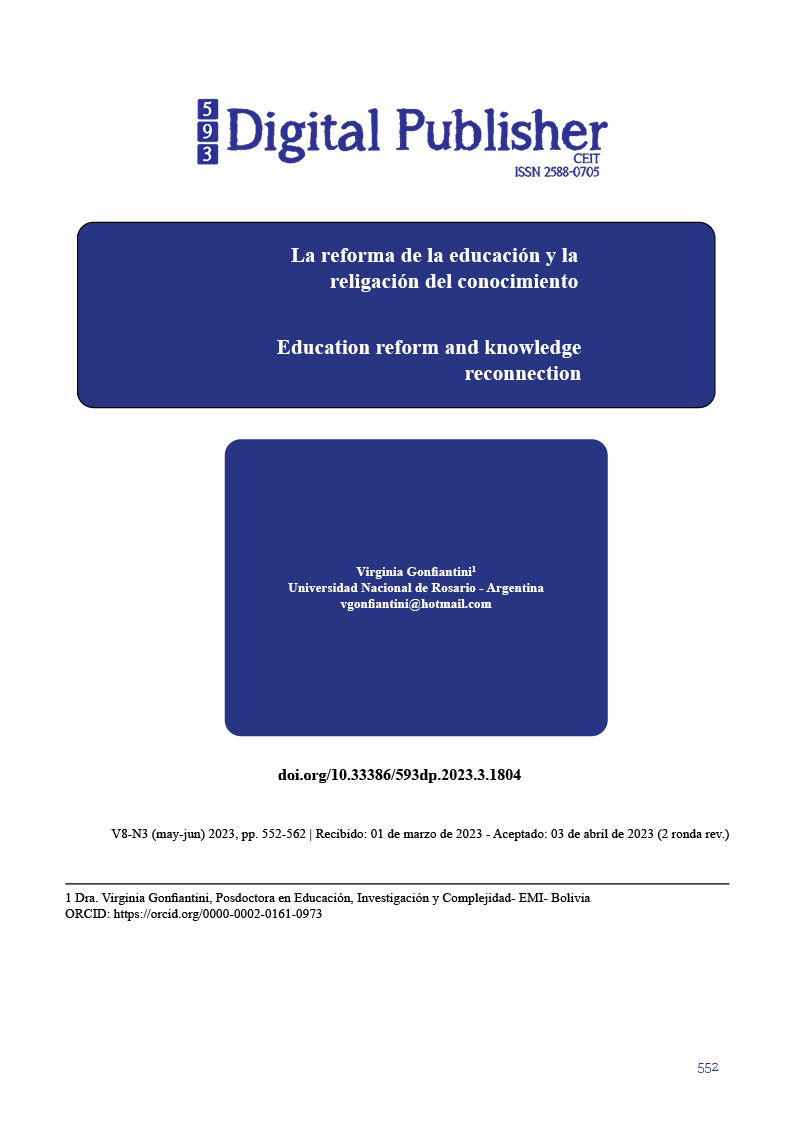Education reform and knowledge reconnection
Main Article Content
Abstract
The educational crisis is a side-effect of the current planetary mega-crisis. In his most recent text, Edgar Morin urges us to change the pathway and re-imagine education today. Changing the pathway entails thinking about educational reforms – epistemic-sociologically and psychologically speaking - than can be conditions of possibility and genuineness, as a paradigmatic rupture in this time of knowledge reconnection. We depart from two provocative thoughts that urge us to reflect:
- Thinking about education as a dialogue of knowledge aimed to recover the human condition. South Thinking and Spirit of the Valley help us revise and argue for this line of thought.
- Reflecting on the context of this global-local crisis, not with an apocalyptical view, but as a hopeful path to think about the metamorphosis in this Kairos-complex time which has been neglected in education.
Since educating in times of uncertainties and contemporary changes requires new epistemological foundations, we propose three issues for reflection:
- We need to contextualize the modern educational discourse.
- We cannot ignore the epistemic ruptures of the twentieth century that give rise to a new era.
- Let's look at the global crisis and metamorphosis from the epistemic and pedagogical South. What is the time of social and pedagogical metamorphosis today?
From these three questions, we will be able to understand that the metamorphosis that we are going through in 2021 occurs on a global scale, thus modifying the set of social, political, economic, cultural, organizational relationships, which urges us to seriously rethink ourselves if we are to think about our actions from a chronological time that reproduces the sameness or from a Kairos-complex time that is based on otherness. Without time, thought collapses, since chronological time does not build, but fragments moments in repetition.
Downloads
Article Details

This work is licensed under a Creative Commons Attribution-NonCommercial-ShareAlike 4.0 International License.
1. Derechos de autor
Las obras que se publican en 593 Digital Publisher CEIT están sujetas a los siguientes términos:
1.1. 593 Digital Publisher CEIT, conserva los derechos patrimoniales (copyright) de las obras publicadas, favorece y permite la reutilización de las mismas bajo la licencia Licencia Creative Commons 4.0 de Reconocimiento-NoComercial-CompartirIgual 4.0, por lo cual se pueden copiar, usar, difundir, transmitir y exponer públicamente, siempre que:
1.1.a. Se cite la autoría y fuente original de su publicación (revista, editorial, URL).
1.1.b. No se usen para fines comerciales u onerosos.
1.1.c. Se mencione la existencia y especificaciones de esta licencia de uso.
References
Bauman, Z. (2007). Los retos de la educación en la modernidad líquida. Barcelona: Gedisa.
Burke, P. (2017). ¿Qué es la historia del conocimiento? Cómo la información dispersa se ha convertido en saber consolidado a lo largo de la historia. Argentina: Siglo XXI.
Chul Han, B. (2021). No-Cosas. Quiebres del mundo de hoy. Buenos Aires: Taurus.
Cullen, C. (2009). Entrañas éticas de la identidad docente. Buenos Aires: La Crujía.
Cullen, C. (2015). “La ética docente entre la hospitalidad y el acontecimiento”, en Ramírez Hernández, I, Beuchot, M. Casado, A., Cullen, C. et. (2015). Voces de la filosofía de la educación. CLACSO. Ediciones Del Lirio.
Cyrulnik, B. (2001). La maravilla del dolor. El sentido de la resiliencia. Buenos Aires: Ediciones Juan Granica.
De Souza, B. (2009). Una epistemología del Sur: la reinvención del conocimiento y la emancipación social. México: Siglo XXI-CLACSO.
Follari, R. (2007). Epistemología y Sociedad. Acerca del debate contemporáneo. Rosario: Homo Sapiens
Freire, P. (1997). Pedagogía de la Autonomía. Buenos Aires: Siglo XXI.
Gonfiantini, V. (2016). El Kairós educativo. Resignificar la formación docente desde la práctica del formador. Rosario: Laborde Editores.
Gonfiantini, V. (2016 b). “Formación docente y diálogo de saberes en el kairós educativo”, en Sophia, Colección de Filosofía de la Educación, núm. 21, pp. 229-245. Universidad Politécnica Salesiana
Gonfiantini, V. (2021). Del Cronos al Kairós. Resignificación del concepto de tiempo en la educación hoy. Ecuador: Centro del Emprendimiento, Innovación y Tecnología CEIT S.A.
Horlacher, R. (2014). “¿Qué es Bildung? El eterno atractivo de un concepto difuso en la teoría de la educación alemana.” Universidad de Zúrich (Suiza) DOI: https://doi.org/10.7764/PEL.51.1.2014.16
Kusch, R. (2007). Obras Completas. Tomo II. Rosario: Fundación Ross.
Morin, E. (2001). ¿Hacia dónde va el mundo? Buenos Aires. Paidós.
Morin, E. (2006). El Método VI. Ediciones Cátedra.
Morin, E. (2007). Articular los Saberes. ¿Qué saberes enseñar en las escuelas? Ed. EUS. https://racimo.usal.edu.ar/1595/1/0040256.pdf
Morin, E. (2008). Complejidad restringida y complejidad generalizada, en Utopía y Praxis Latinoamericana / Año 12. No 38 (pp. 107 – 119)
Morin, E. (2011). Como vivir en tiempos de crisis. Buenos Aires: Nueva Visión.
Morin E.; Hessel, S. (2013). El camino de la esperanza. Una llamada a la movilización cívica. Buenos Aires: Paidós.
Morin, E. (2015). Enseñar a vivir. Manifiesto para cambiar la educación. Buenos Aires: Nueva Visión.
Morin, E.; Delgado, C. (2016). Reinventar la Educación. Abrir caminos a la metamorfosis de la humanidad. México: Multiversidad Mundo Real Edgar Morin
Morin, E. (2020). Cambiemos de Vía. Lecciones de la pandemia. España: Paidos.
Nicolescu, B. (1996). La transdiciplinariedad. Manifiesto. México: Multiversidad Edgar Morin


